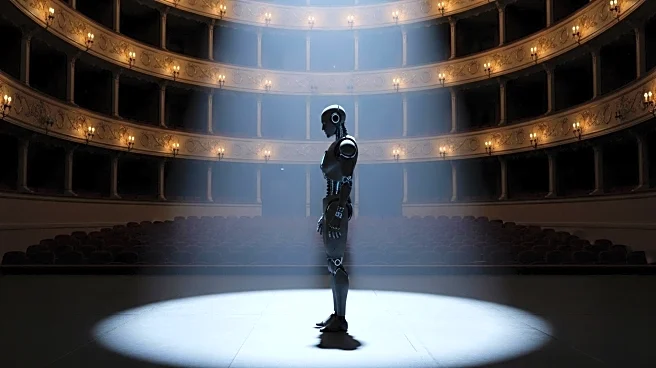What's Happening?
Hollywood celebrities, including Emily Blunt and Natasha Lyonne, have expressed outrage over the creation of Tilly Norwood, an AI-generated 'actor' developed by Dutch comedian Eline Van der Velden. The AI character, designed to resemble a young actress, has sparked controversy as it enters talks with talent agencies. The Screen Actors Guild-American Federation of Television and Radio Artists (SAG-AFTRA) has criticized the use of AI actors, stating that they lack the life experience and emotional depth of human performers. The union warns that employing AI actors could undermine contractual protections secured after the 2023 Hollywood strikes.
Why It's Important?
The emergence of AI actors like Tilly Norwood raises significant concerns about the future of human performers in Hollywood. SAG-AFTRA's condemnation highlights the potential threat to actor livelihoods and the devaluation of human artistry. The controversy underscores the ongoing debate about the ethical use of AI in creative industries, particularly in light of recent labor strikes that emphasized protections against AI technology. The backlash from Hollywood celebrities and unions suggests a growing resistance to AI's encroachment on traditional acting roles.
What's Next?
As the debate over AI actors continues, talent agencies and studios may face increased pressure to avoid engaging with synthetic performers. SAG-AFTRA's statement serves as a warning that using AI actors without proper contractual compliance could lead to industry-wide boycotts. The controversy may prompt further discussions on the ethical implications of AI in entertainment, potentially influencing future regulations and industry standards. Eline Van der Velden's insistence that Tilly Norwood is a creative work rather than a replacement for human actors may not be enough to quell the backlash.
Beyond the Headlines
The creation of AI actors like Tilly Norwood raises broader ethical questions about the use of AI in art and entertainment. While Van der Velden views AI as a new tool for storytelling, critics argue that it risks eroding the human element that is central to performance art. The controversy may lead to a reevaluation of the role of AI in creative industries, with potential long-term implications for how art is produced and consumed. The debate also touches on issues of identity theft, as AI actors are trained on the work of real performers without their consent.









